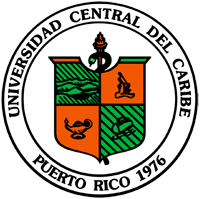Universidad Central del Caribe
Coordinates: 18°21′58.3″N 66°09′12″W / 18.366194°N 66.15333°W
 | |
| Type | Private |
|---|---|
| Established | 1976 |
| Location |
|
| President | Jose Ginel Rodriguez, M.D. |
| Colors | orange/green |
| Website |
uccaribe |
The Universidad Central del Caribe (Central University of the Caribbean) is a private non-profit university in Bayamon, Puerto Rico offering graduate studies and professional certifications in health sciences. It was founded in 1976 in the municipality of Cayey, but since 1990 all its facilities have been integrated into one campus at the grounds of the Dr. Ramón Ruiz Arnau University Hospital in Bayamón.
Accreditations
The Universidad Central Del Caribe is accredited by the following organizations:
- Accreditation Council for Graduate Medical Education (ACGME)
- Committee on Allied Health Education of the American Medical Association
- Council on Higher Education of Puerto Rico
- Liaison Committee on Medical Education (LCME)
Both programs have been duly authorized and accredited by the Council on Higher Education of Puerto Rico. Their accreditation process requires survey visits every four years. The last one took place in December 1996 and resulted in renewed accreditation in 1997.
In 1989, this accrediting body authorized the Graduate Program in the Biomedical Sciences within the School of Medicine. This program offers Masters in Science and in Arts in Anatomy, Physiology, Biochemistry, Pharmacology, and Microbiology. The program leading to the M.D. holds full accreditation from the Liaison Committee on Medical Education (LCME). As of May 2000, the Medical School has graduated 1,590 physicians serving the Commonwealth of Puerto Rico and Hispanic communities in the United States. The Radiologic Technology Program holds full accreditation by the Committee on Allied Health Education of the American Medical Association. This Program has awarded 458 degrees from its inception to May, 2000.
In 1984, the University began what has been a very successful contractual relationship with the government's hospital facility for the Northeastern Health Region. As a result of this arrangement, the Dr. Ramón Ruiz Arnau Hospital was established as the University Hospital. In addition, the network of municipal health centers that provide primary care services within the health region became a site for clinical teaching. A progressive evolution of this educational service consortium is underway, providing for the development of an academic medical center that will avail the island of additional educational programs in various Health Sciences disciplines. Four graduate medical education programs accredited by the Accreditation Council for Graduate Medical Education (ACGME) are based in the University Hospital.
Since September, 1990, all University facilities have been integrated into one campus at the grounds of the Dr. Ramón Ruiz Arnau University Hospital in the city of Bayamón. Since then, the Council on Higher Education of Puerto Rico authorized and accredited four new programs in the University: in 1993 the Certificate Program in Diagnostic Medical Sonography, and in 1996 the Substance Abuse Counseling Program. The Substance Abuse Program offers the Post-Baccalaureate Certificate in Substance Abuse Counseling and the Master of Health Sciences in Substance Abuse Counseling. Certificate Program in Mammography was authorized in 2000, and two Certificates in Computerized Tomography and in Magnetic Resonance were authorized in 2002 and the new Bachelor of Science in Diagnostic Images was approved in 2006 under the auspice of the Medical Imaging Technology Program.
Students
Throughout its history, Universidad Central del Caribe has served two very distinct student populations: young adults pursuing graduate and professional degrees and high school graduates aiming to complete an undergraduate education. Currently, these two groups comprise the majority of the full-time student body.
Most recent developments in the graduate and undergraduate programs have conveyed increases in non-traditional students enriching the student body. Diversity at the UCC comprises the added value to the academic community of individuals (staff/administration, faculty and students) representing certain segments of the population, such as those from low socioeconomic backgrounds and first generations in pursuing a professional degree, that enriches the scenarios in which the UCC activities take place. It is expected that these individuals, particularly as pertaining to our students, will provide health care services of excellence to the communities that they are representing. Additionally, the interaction among the constituents will help foster lifelong positive attributes.
Faculty
Faculty has consistently being identified as one the Universidad Central del Caribe’s most valuable strength. Faculty is actively engaged in teaching, research, and service delivery in fulfillment of the University’s mission. The Faculty consists of highly specialized professionals who have made valuable contributions to their fields of expertise. They are graduates of local, Mainland, and foreign institutions, some of whom have been in our Institution for more than twenty years. At the present time, many of the faculty are dedicated primarily to academic responsibilities and in smallest percents to service delivery, and to research activities. One of the most important contributions of our faculty in the area of scientific investigation has been the development of four research centers: the Neuroscience and Behavioral Center, the Cell and Molecular Biology Center, the Retrovirus Research Center, and the Institute for Research, Education and Services in Substance Abuse. A testament to the excellence in conducting timely and valuable research has been the faculty’s ability to keep the UCC as the second institution in Puerto Rico receiving grant funds awarded by the National Institutes of Health.[1]
References
- ↑ "Our Faculty". UCC Academics.
External links
- uccaribe.edu - official site.